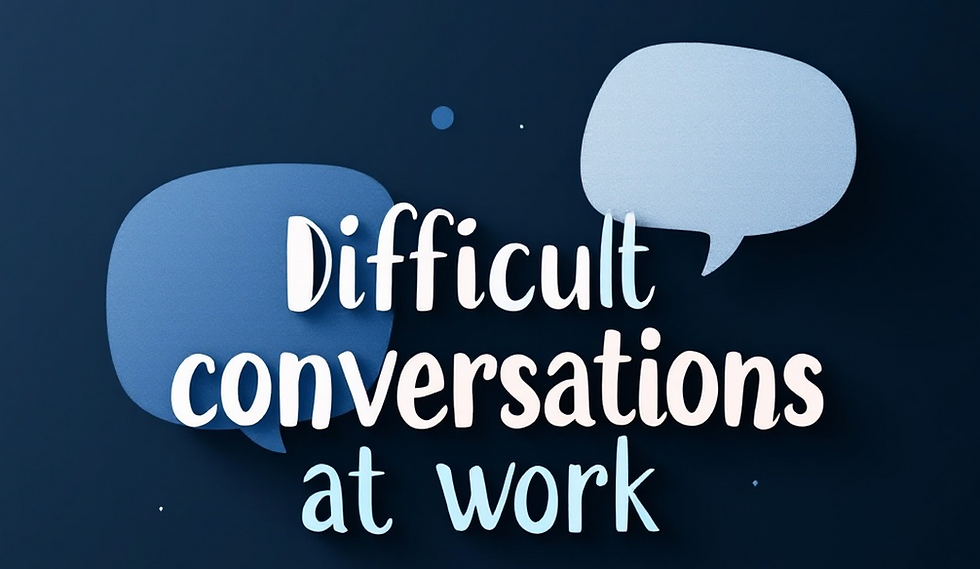Why We Don’t Speak Up – And How to Change That
- Elevation Occ Psy

- May 25, 2025
- 3 min read
Think of a time when you needed to say something important at work, maybe you had to challenge a colleague’s behaviour, give honest feedback to your boss, or ask for support with a personal issue. Now ask yourself: Did you do it? If not, why?
For many of us, difficult conversations at work are among the most avoided and emotionally charged experiences we face. We might know they’re necessary. We might even rehearse what we’d say. But when the moment comes, we freeze, deflect, or delay. And often, we never say anything at all.
But this isn’t a communication problem, it’s a behavioural one. New insights into workplace dialogue suggest that avoiding hard conversations isn’t about lacking skill or vocabulary. It’s about fear, risk, and emotional readiness.
The Hidden Anatomy of Avoidance
When we sidestep difficult conversations, we’re usually responding to internal signals of threat. These might be fears of damaging a relationship, being seen as difficult, or triggering conflict. Even people who are confident and articulate can find themselves paralysed when the stakes feel personal.
These responses are not irrational. They are self-protective. We assess whether we have the ability to navigate the situation, whether the environment feels safe, and whether we’re emotionally ready to act. If any of those three are missing, avoidance becomes the default.
This means that telling people to “be brave” or “speak up” often misses the point. The problem isn’t just willpower. It’s that they may not feel safe or able to engage.
Behaviour, Not Just Communication
When you view conversations through the lens of behaviour, the challenge becomes clearer. Our actions, or inactions, are driven by a combination of three things:
Capability: Do I have the skills and psychological resources to manage this conversation well?
Opportunity: Does my environment support open, respectful dialogue? Is there enough trust?
Motivation: Do I feel emotionally and psychologically ready to speak up?
Of these three, motivation, particularly emotional motivation, turns out to be the biggest roadblock. It’s not that we don’t want to speak. It’s that we’re unsure it’s safe to do so. We fear being misunderstood, judged, or shut down. And so, we stay silent.
Understanding the Emotional Journey
Instead of focusing solely on the “how-to” of communication, we should consider the process people go through when they face a difficult conversation. This process often follows a pattern:
Tension builds: Something feels off—there’s discomfort, uncertainty, or friction.
Risk is assessed: We ask ourselves, “What’s at stake if I speak up?” We think about consequences, relationships, and our own confidence.
Internal barriers emerge: We may doubt our skills, feel unsupported, or simply feel too emotionally raw to act.
Decision point: Based on how prepared or safe we feel, we either engage in the conversation, or avoid it.
Reflection: Afterward, we either feel relief and resolution, or regret and rumination if we avoided it.
By recognising this pattern, organisations can better support employees, not just by teaching them what to say, but by preparing them emotionally and psychologically to say it.
What Actually Helps
To truly improve how people engage in difficult conversations, we need to look beyond one-size-fits-all toolkits. What works for a low-stakes conversation between peers won’t cut it when someone is disclosing a health condition or raising an issue of discrimination. Context, trust, and emotional readiness all matter.
Instead, we need support strategies that match the risk level of the conversation. These might include:
Preparation tools: Helping people plan their message, anticipate reactions, and ground themselves emotionally.
Coaching or rehearsal: For higher-stakes conversations, guided support can reduce anxiety and clarify goals.
Cultural scaffolding: Leaders play a key role in modelling openness, admitting vulnerability, and creating spaces where honesty isn’t punished.
Emotional safety: When people know they won’t be penalised for speaking candidly, they’re far more likely to try.
It’s also important to validate that not every conversation will happen right away. Readiness is real. Some people may need time to build clarity or courage, and that’s okay. What matters is giving them the tools and psychological permission to take that step when they’re ready.
Changing the Narrative
For years, we’ve treated difficult conversations as technical tasks: say this, avoid that, follow this script. But these are human moments, not just verbal ones. They are shaped by emotion, identity, and trust.
If we want to change how people communicate at work, we need to treat readiness as a behavioural issue. That means building environments where people feel equipped, supported, and motivated, not just instructed, to speak.
The conversations we avoid often hold the greatest potential for change. They are moments where relationships can deepen, trust can be built, and inclusion can become real. But only if we recognise that behind every unsaid word is a very human reason why.
And that’s where the work truly begins.




Comments